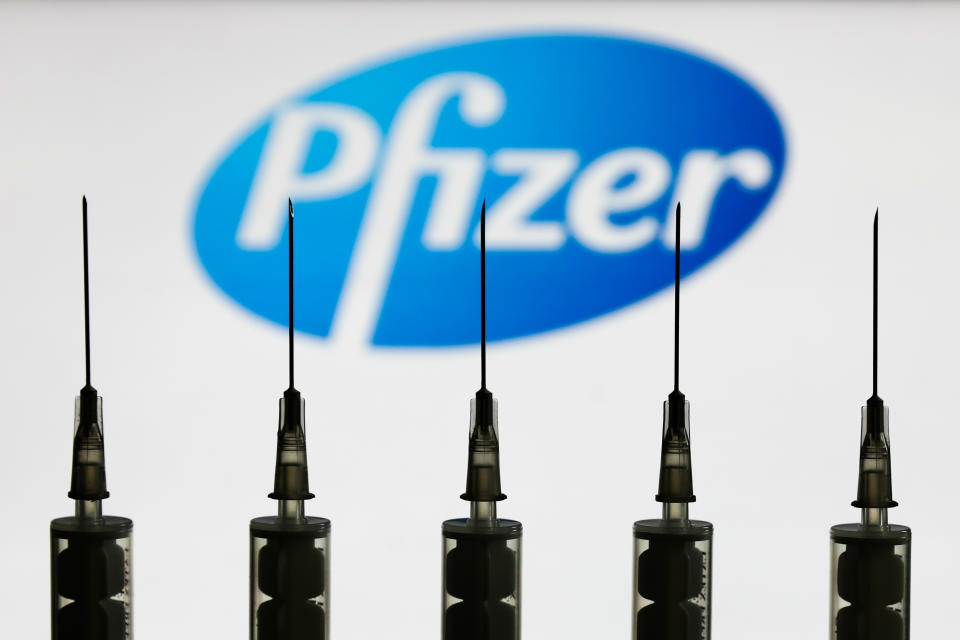Coronavirus update: Pfizer seeks vaccine authorization in November; Medicare cuts delayed COVID-19 testing payments
The U.S. is increasingly likely to get a vaccine authorized for emergency use before the end of the year, with Pfizer (PFE) and partner BioNTech (BNTX) ready to file by the third week of November.
Pfizer CEO Albert Bourla penned a letter addressing the American people Friday, explaining the vaccine trial process and why and how the company hopes to have initial data by the end of October— a timeline the company has maintained all along— but will wait until November to apply for emergency use.
The U.S. Food and Drug Administration (FDA) recently adopted guidelines to ensure safety through an extended monitoring period of two months, an increase from the previous one month. The move has been lauded by health experts, but has also been a political win for the health agency in thwarting pressure from the White House to have a vaccine by Election Day.
In his letter, Bourla explained there were three areas of focus: safety, efficacy and manufacturing quality data.
“To ensure public trust and clear up a great deal of confusion, I believe it is essential for the public to understand our estimated timelines for each of these three areas,” Bourla said.
“A key point that I’d like to make clear is that effectiveness would satisfy only one of the three requirements and, alone, would not be enough for us to apply for approval for public use,” he added.
Top FDA officials also weighed in on the follow-up timeline in the New England Journal of Medicine Friday.
“At stake is public confidence in America’s response to the pandemic, in Covid-19 vaccines, and in vaccines in general, all of which are essential to achieving desired public health outcomes,” the authors wrote. They noted that a two month follow-up period was necessary because of the pandemic, but otherwise a six month follow-up is the norm.
“The FDA generally requires at least 6 months of safety follow-up,” they said, adding, “Given that some vaccines under evaluation for preventing Covid-19 are based on technologies not previously used in licensed vaccines, arguments could be made in favor of longer safety follow-up to support an EUA.”
The timeline outlined by Pfizer is well ahead of that of competitor Moderna (MRNA), which said it will have its data by Thanksgiving Day.
The FDA has said it takes several weeks to process an emergency use authorization (EUA), which could mean one could be issued by the end of 2020. But any EUA would only lead to allowed use by high-priority and high-risk individuals, which will be defined at an advisory committee meeting on October 22

Test stress
As the country begins a second wave of coronavirus outbreaks, concerns about testing capacity and potential widespread bottlenecks are once again in focus.
During the peaks of the pandemic earlier this year, hotspots saw turnaround times last a week, or in some cases more, rendering the results clinically useless. Health experts criticized the delays and, on social media, went so far as to suggest the labs shouldn’t be reimbursed for the delayed results.
In that spirit, the Centers for Medicare and Medicaid Services (CMS) announced Thursday it would penalize labs who provide test results after more than two days. Following outcries from the clinical lab industry about low reimbursements, CMS increased payments from $51 to $100 for COVID-19 high throughput tests. Now, CMS will reduce payment to $75 for any test results after two days.
The American Clinical Laboratory Association (ACLA) is concerned about the move as it sets a precedent for private insurers, which already only pay a fraction of the CMS rate, to follow.
“Cutting laboratory reimbursement won’t address the root causes of delayed turnaround times. Turnaround time is driven largely by fluctuations in demand and access to critical supplies. As states across the country experience a surge in new cases, the global demand for testing supplies remains high,” said ACLA president Julie Khani.
Adding to the pressure, labs have recently been experiencing an increase in claim denials for tests after the federal government issued new guidance, in June, ending coverage mandates for COVID-19 testing.
A spokesperson for ACLA said the denials are based on not being “medically necessary” or not being “covered,” as individuals seek tests even if they are asymptomatic or suspect they have the virus.
Dr. Howard Koh, a public health professor at Harvard University and former U.S. Assistant Secretary for Health in the Obama administration, told Yahoo Finance that the testing situation still needs attention as the second wave hits.
“The good news is we have more tests available ... but we also need to test smarter. We need to focus on high risk populations,” such as nursing homes and communities that have been disproportionately hit, he said.
More from Anjalee:
Redfield: CDC 'preparing earnestly' for vaccine in November, December
India's tech giants navigate 'literally spiking' WFH demand, H1-B fears in coronavirus era
How protests spurred Corporate America into action on race, inequality
Read the latest financial and business news from Yahoo Finance
Follow Yahoo Finance on Twitter, Facebook, Instagram, Flipboard, SmartNews, LinkedIn, YouTube.
